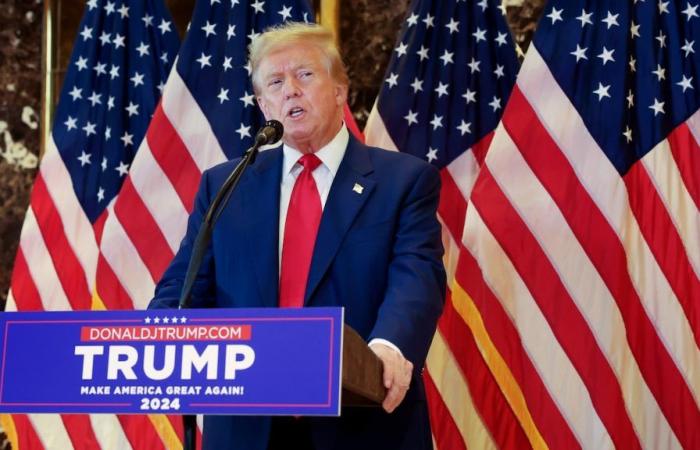
In its most far-reaching decision of the year, the top U.S. court ruled Monday that a former president enjoys absolute immunity for official acts, but not for acts committed in a personal capacity.
The ruling makes it virtually impossible to hold the former president’s – and likely Republican nominee’s – criminal trial in Washington before the November election.
Four days after winning his debate by default against President Joe Biden, who delivered a catastrophic performance, Donald Trump has thus won a second victory.
The highest court in the United States is sending the case back to Judge Tanya Chutkan, who will have to decide between the former president’s actions in the context of his duties, for which he will be protected by presidential immunity, and those in his private domain, for which he can be prosecuted.
Preliminary hearings on the issue and the expected appeals process are expected to take months, likely pushing the trial beyond the November 5 election.
A possible victory for the Republican candidate would then allow him to ask the Justice Department to drop the charges.
Under our constitutional structure of separation of powers, the nature of presidential power provides a former president with absolute immunity from criminal prosecution for acts within his constitutional authority.
the court wrote in a 6-3 decision that illustrated the division between conservative and progressive justices.
[Un ancien président] is also entitled to at least presumptive immunity from prosecution for all his official acts. There is no immunity for unofficial acts.
The nation’s highest court is giving in to arguments from Donald Trump’s lawyers that the lack of presidential immunity opens the door to partisan lawsuits after he leaves office.
A president inclined to take a course of action based on the public interest might instead opt for another course of action, for fear of criminal sanctions when he leaves office.
said Supreme Court President John Roberts, author of the historic decision.
Under the pen of Sonia Sotomayor, the three dissenting justices virulently criticize their conservative colleagues.
Fearing for our democracy, I express my dissent,
Justice Sotomayor wrote, even avoiding the word respectfully
usually used by magistrates who disagree with the majority.
[…] mocks the founding principle of our Constitution and our system of government that no one is above the law”,”text”:”The decision taken today[…] mocks the founding principle of our Constitution and our system of government, according to which no one is above the law”}}”>The decision taken today […] makes a mockery of the founding principle of our Constitution and our system of government, according to which no one is above the law
she regretted.
The relationship between the president and the people he serves has changed irrevocably. In every use of his official power, the president is now a king above the law.
The majority decision in this case treads dangerous ground
added colleague Ketanji Brown Jackson.
: a model of presidential accountability that creates immunity– an exemption from criminal prosecution– that applies only to the most powerful official in our government”,”text”:”The majority has concocted something quite different: a model of presidential accountability that creates an immunity – an exemption from criminal prosecution – that applies only to the most powerful official in our government”}}”>The majority has concocted something quite different: a model of presidential accountability that creates an immunity—an exemption from criminal prosecution—that applies only to the most powerful official in our government.
she laments.
A weakened pursuit
The Supreme Court has generally refrained from identifying which of Trump’s actions were official and which were personal, but has addressed some facts that support the indictment.
Thus, the conversations between Donald Trump and the Justice Department constitute an official act and are therefore excluded from prosecution.
The pressure he allegedly exerted on then-Vice President Mike Pence not to certify Joe Biden’s victory is in a gray area that the district court will have to clarify.
On this point, Donald Trump enjoys immunity. presumed
but the court will have to determine whether this presumption is invalidated in the current circumstances
since January[…] in his capacity as President of the Senate”,”text”:”the Vice President presides over the certification procedure of January 6[…] in his capacity as President of the Senate”}}”>Vice President presides over certification procedure on January 6 […] in his capacity as President of the Senate
and not as a member of the executive.
In addition to excluding official acts from criminal prosecution, the Court concludes that evidence concerning official acts cannot be presented to support charges relating to acts in the private domain.
On this point, Judge Amy Coney Barrett, appointed by Donald Trump, expressed her disagreement.
Raising a hypothetical example of corruption, she said that hiding from the jury the official act that a president allegedly committed in exchange for a bribe would paralyze
the pursuit.
Republicans Rejoice, Democrats Alarmed
The decision, which was predictable given the course of the April arguments, was greeted with great enthusiasm among Republicans and decried by Democrats.
Donald Trump welcomed the decision on his network Truth Social : GREAT VICTORY FOR OUR CONSTITUTION AND DEMOCRACY. PROUD TO BE AMERICAN!
This should put an end to all the witch hunts launched against me by dishonest Joe Biden.
added the Republican presidential candidate, who has been repeating for months without proof that his successor is behind the four criminal trials brought against him.
In a call to journalists, reported by the New York Timesa spokesman for Joe Biden’s campaign said the Supreme Court had just give Donald Trump the keys to a dictatorship
. We must do everything in our power to stop it
he said.
The reactions from their respective camps were in the same direction.
The Speaker of the House of Representatives, Republican Mike Johnson, for example, welcomed a decision consistent with the Constitution and common sense
.
Today’s decision by the Court is a victory for former President Trump and all future presidents, and another defeat for the Justice Department that has been instrumentalized by President Biden and [le procureur spécial] Jack Smith.
The Democrats’ tone was quite different.
It’s a sad day for America and a sad day for our democracy.
for example, reacted the leader of the Democratic majority in the Senate, Chuck Schumer.
Treason or incitement to insurrection should not be considered an essential constitutional power granted to a president.
On the social network X, Representative Alexandria Ocasio-Cortez denounced a assault on american democracy
attacking a Supreme Court consumed by a corruption crisis
.
At the same time, she announced that she would present articles of impeachment as part of an impeachment procedure, without specifying what these articles would be and which judges from the conservative majority would be targeted.
The procedure is doomed to failure, however, because the House is controlled by the Republicans, who will nip the process in the bud.
A decision taken very slowly
Open in full screen mode
De gauche à droite : Amy Coney Barrett, Neil Gorsuch, Brett Kavanaugh, Ketanji Brown Jackson, Sonia Sotomayor, Clarence Thomas, John Roberts, Samuel Alito et Elena Kagan.
Photo : Getty Images / Alex Wong
The Supreme Court waited until the last day of its session to issue its most important decision — nearly 70 days after hearing oral arguments from the parties.
In February, when she agreed to hear the case, she set oral arguments for April 25, the last day on her schedule for oral arguments in all cases.
The former president’s critics also blame the high court for rejecting special counsel Jack Smith’s request in December to rule on the case urgently, letting the appeals court first consider the matter.
In the past, the Supreme Court has rushed to judge sensitive cases related to the presidency.
In 1974, she ordered Richard Nixon to turn over the secret recordings in the Watergate case 16 days after hearing the parties’ arguments. Then, in 2000, she ruled on the election dispute between Republican George W. Bush and Democrat Al Gore the day after the arguments.
Donald Trump’s fate was in the hands of a Supreme Court with a strong conservative majority, which he helped shape by appointing a third of the justices.
There have been calls, in vain, for two justices who are considered the most right-wing to recuse themselves due to suspicions of pro-Trump bias: Clarence Thomas and Samuel Alito.
In the weeks following the 2020 presidential election, the former’s wife advised Donald Trump’s then-chief of staff, Mark Meadows, on strategy for contesting the election.
The second is at the center of a controversy because two flags associated with pro-Trump supporters who contest Joe Biden’s victory were flown outside his home and his vacation home.
A few days ago, the Supreme Court delivered another victory to Donald Trump and his allies by ruling in favor of one of his supporters who participated in the assault on the Capitol on January 6, 2021, the date on which elected members of Congress were meeting to certify Joe Biden’s victory.
The court thus limited the scope of an obstruction of official process statute that the Justice Department invoked in its indictment of the plaintiff. Hundreds of other people — including Donald Trump — have been charged under that count.
In a 1982 decision on Republican Richard Nixon, the highest court in the United States had already ruled that a former president had presidential immunity protecting him from civil suits for actions taken in the course of his official duties.
In more than 200 years of history, however, this is the first time that the question of the criminal responsibility of a former president has arisen, since Donald Trump is the first former president to be the subject of criminal charges.
The Supreme Court case arose from an argument made by Donald Trump’s lawyers in the criminal trial brought against him by special counsel Jack Smith.
Indicted for his alleged efforts to overturn the 2020 presidential election results, which culminated in the storming of the Capitol by hundreds of his supporters, the 78-year-old politician faces charges of exceptional gravity.
He faces four counts, including conspiracy to defraud the United States and conspiracy to obstruct an official proceeding.





